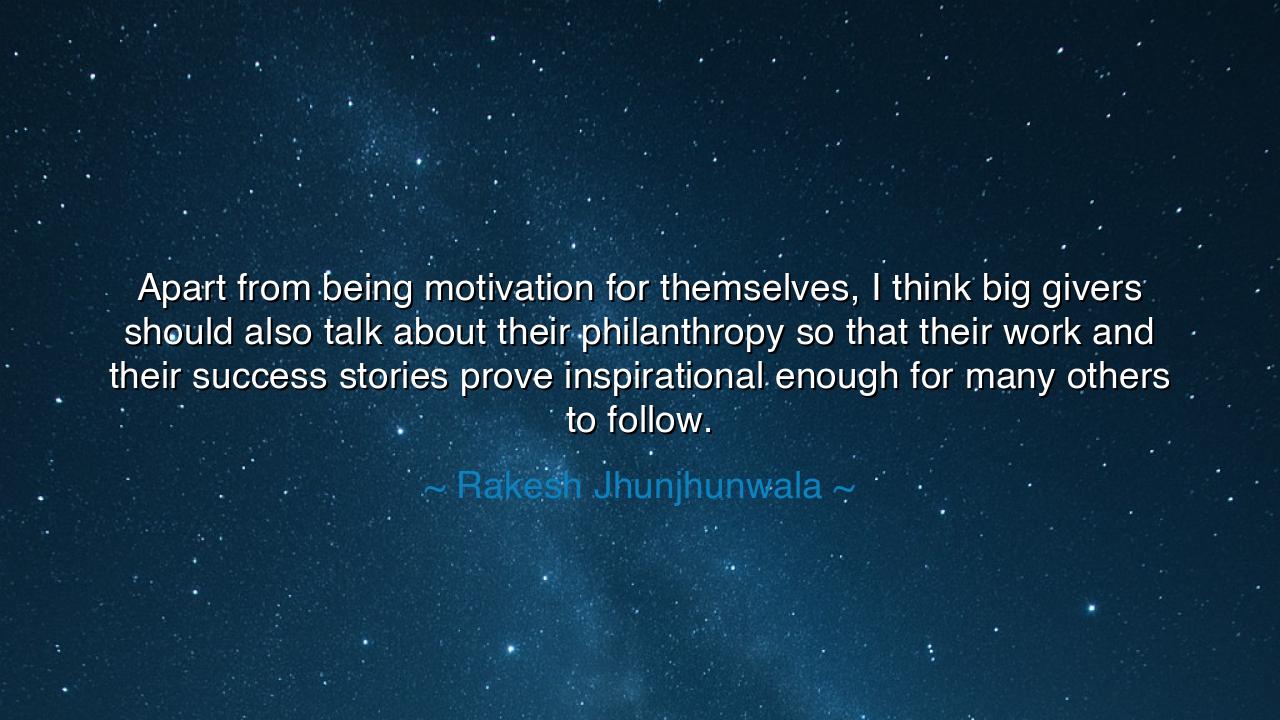
Apart from being motivation for themselves, I think big givers
Apart from being motivation for themselves, I think big givers should also talk about their philanthropy so that their work and their success stories prove inspirational enough for many others to follow.






In the great cycle of human life, there are those whose wealth, success, and accomplishments are not simply meant for personal gain, but are meant to uplift others. Rakesh Jhunjhunwala, in his thoughtful reflection, reminds us of a powerful truth when he says, "Apart from being motivation for themselves, I think big givers should also talk about their philanthropy so that their work and their success stories prove inspirational enough for many others to follow." This statement calls upon the duty and power of those who have achieved greatness—not just to use their gifts for personal benefit, but to use their story and success to inspire others to give, to act, and to create positive change in the world. The act of giving is not a silent gesture, but one that, when shared, can multiply its impact, serving as a beacon for others to follow.
In the ancient world, those who had wealth and power were often expected to use their position not just for personal enjoyment, but for the betterment of society. Cyrus the Great, the founder of the Persian Empire, is known for his ability to conquer vast lands, but also for his vision of benevolent leadership. He believed that a ruler’s success should be measured by his ability to care for the people, to provide for them, and to empower them to thrive. His actions, and his example, became inspirational, serving as a model for future generations of rulers. Cyrus, like Jhunjhunwala’s big givers, understood that true greatness is not in the personal accumulation of wealth or power, but in how one uses that success to benefit others, to inspire others to act, and to elevate the collective spirit of the people.
Consider the ancient philanthropists of Rome, such as Marcus Crassus, who, despite his immense wealth, used his resources to fund public works, to feed the poor, and to support education. The Romans, in their understanding of virtue and honor, saw wealth not as a personal possession, but as a tool to be used for the common good. Crassus’ public generosity, though it was sometimes overshadowed by his political ambitions, was still seen as a model of how wealth could be used for the benefit of the many. In the same way, Rakesh Jhunjhunwala’s words call on modern philanthropists to be not just silent benefactors, but active communicators, to speak of their acts of giving, and to inspire others to follow in their footsteps.
There is great wisdom in Jhunjhunwala’s message that philanthropy, when shared, becomes a powerful tool for change. Inspiration is not born from silence, but from the stories we share—the stories of how success was used to uplift others. Just as Homer’s epic tales of heroes and their deeds were shared far and wide, their stories became not just entertainment, but inspiration for countless others to rise above their own limitations. The acts of charity, when told, inspire others to act, to give, and to create their own legacies of generosity. Philanthropy, shared through words and deeds, becomes a movement, spreading and growing in ways that transcend individual actions.
The lesson we can learn from this is clear: those who are fortunate enough to experience success, whether in wealth, wisdom, or power, have a responsibility to share their journey, to tell their story of giving, so that others may be motivated to do the same. As Rakesh Jhunjhunwala suggests, it is not enough to give in silence, but to share the story of giving in such a way that it sparks a movement, a shift, where the act of generosity is seen not as an isolated event, but as a community endeavor. By speaking of the impact of our actions, we can encourage others to join in and multiply the goodness in the world.
Consider the example of modern philanthropists like Warren Buffett and Bill Gates, who not only gave away large portions of their wealth but also publicly shared their commitment to philanthropy. Their stories, their efforts, and their dedication to giving have inspired countless others to act in kind, creating a ripple effect of generosity across the globe. Their work has proved that wealth, when shared, does not diminish; it multiplies, enriching the world and the lives of others in ways that far exceed the value of material possession. Just as Buffett and Gates have inspired millions, so too can any giver whose actions are shared and celebrated inspire others to follow.
To future generations, the lesson is simple yet powerful: do not hide your giving, but share it. Your story of generosity, no matter how small it may seem, holds the potential to inspire others to act, to give, and to create a ripple of positivity and change. The world is shaped not just by the wealth we accumulate, but by the stories we tell, by the impact we make, and by the legacy of generosity we leave behind. Live with open hands, give with an open heart, and share your story—for in doing so, you become a beacon of hope, a guiding light for others to follow.






AAdministratorAdministrator
Welcome, honored guests. Please leave a comment, we will respond soon